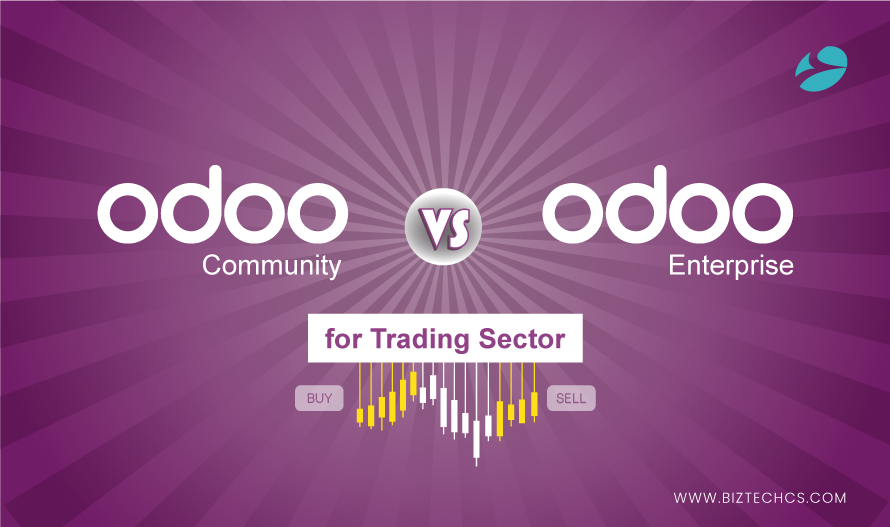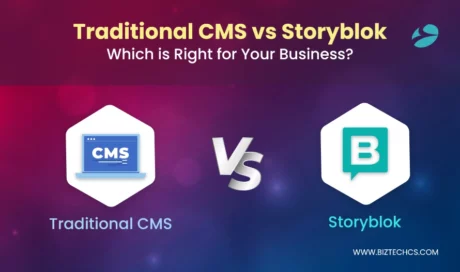1392
Odoo Solutions: Community vs. Enterprise for Trading Industry
19 Mar, 2024
7 min read
1392
19 Mar, 2024
7 min read
Table of content

A trading business consists of a wide range of operations related to the selling and purchasing of commodities, services, and financial instruments. It is also fast-paced, complex, and critical for the functioning of the global economy.
The adoption of advanced technology has further redefined the trading industry. By investing in robust ERP systems like Odoo, trading businesses can attain operational efficiency, plan finances, and get help with compliance and risk management.
While Odoo provides an extensive suite of business applications for the trading industry, comparing Odoo Community vs Enterprise and picking the best one is more complex.
In this blog post, we will compare the two Odoo versions, Community and Enterprise, and help you pick the suitable one for your trading business.
But first, let’s introduce you to the two versions!
For those who are not familiar with Odoo, it is a suite of business applications that can improve your business operations, help with financial analysis and decision-making, curate engaging customer interactions, and more.
With Odoo, you get a vast collection of business apps under one roof – Accounting, CRM, Point of Sale, Website, Manufacturing, HR, and more.
Odoo Community is the open-source core version, which was released in February 2005. Businesses don’t have to pay any license fee to use the OpenERP community version.
It comes with some basic features out of the box, such as desktop support, Invoicing and payments features, expense management, website builder, eCommerce, inventory, CRM, Sales, and POS modules.
While the Odoo Open Source version gives you access to core functionalities of the ERP, it is also known to be modular and scalable. You can start with basic functionalities and add more modules and custom features as your business grows.
Being open-source, it gives you a lot of flexibility in customizing features specific to your trading industry. However, you may need help from a leading Odoo development company in this regard. The flexibility and modularity are some of the few reasons why the Community version is so popular amongst small to medium-scale businesses.
While you don’t get any official support and maintenance from the Odoo team (as extended for Odoo Enterprise), you can still rely on the huge and active community of developers who contribute, share modules, and offer support.
Up until the release of Odoo version 9 in 2015, Odoo was available as an OpenERP. With the release of Odoo 9, Fabien Pinckaers announced that the OpenERP version (available now as a Community edition) will be separated from the newly released Odoo Enterprise version.
The Enterprise edition was released to fund the operations of the Odoo Community version and is available as licensed software. Unlike Odoo Community, you get access to official support, maintenance, and cloud hosting services directly from Odoo SA, the company behind Odoo.
Support for mobile apps, advanced modules & features, and access to Odoo Studio are some of the key differences between the two versions. While it offers extensive features and capabilities, the Odoo Enterprise Pricing is something businesses have to carefully consider.
| Plans | One App (For 1 App Only) | Standard (All Apps, Odoo Online) | Custom (All apps, Odoo Online, Odoo Studio, External API) |
| Pricing | Free | $24.90/ user/month | $37.40/ user/month |
By now, you must have become familiar with the basics of the two Odoo versions. But, what specifically changes for a trading business?
Can investing in Odoo Enterprise get you better ROI? Help with better customer experience?
That’s something we will discover by comparing Odoo Enterprise Vs Community for trading companies.
First, let’s check some of the things that Odoo Community lacks in comparison to Odoo Enterprise!
Trading businesses handling the selling and purchasing of physical goods rely on their logistics and fulfillment processes. Having a Shipping Connector to integrate their eCommerce and ERP systems with multiple reliable shipping service providers can be extremely beneficial for businesses.
With automation, they can automatically track their shipments, connect with global leaders in shipping, save time & costs, and manage delivery time efficiently.
While the Odoo Enterprise version provides you with the advanced capability of integrating a shipping connector to your system, the Community version lacks in this aspect.
For a trading business, shipping and fulfillment are critical aspects of its day-to-day operations. Thus, having a functionality that helps businesses calculate shipping costs is pivotal too.
With accurate shipping cost computation, businesses are capable of analyzing the true cost of shipping and forming pricing strategies that help maintain profitability. It helps in risk management, negotiations with shipping service providers, budgeting, and financial forecasting.
You won’t find this feature in the Odoo Community version, and that can be a setback if you deal with the shipment of goods and physical products.
Odoo Studio is a dedicated app builder integrated within the Odoo Enterprise ecosystem. It gives you a simple drag-and-drop interface that lets you create apps and reports, customize existing apps, curate engaging UI designs, manage workflows, automate, and more.
Without having to code everything, Odoo Studio gives you the flexibility to extend your ERP system’s capabilities seamlessly. It may come as a useful feature for trading businesses as they have to continuously adapt to evolving business needs, customer demands, and regulatory requirements.
Tools like Odoo Studio are excellent for maintaining a competitive edge in the fast-paced trading environment. However, Odoo Community users don’t have access to Odoo Studio for customization or app building.
A trading business deals with huge amounts of money and transactions that need to be recorded, documented, and invoiced. Thus, accounting and invoicing are some basic building blocks of any trading enterprise.
While the Odoo Community version does not grant access to the Odoo Accounting module, you can still use the Odoo Invoicing feature. It enables you to create invoices, print or send emails, manage supplier invoices, import vendor bills, personalize invoices and bills, handle recurring invoices, and so on.
Note that the 3-way matching payment rule is not available in the Odoo Community version. As per this feature, the purchase order, receipt, and vendor bills are compared to decide if the order is accurate or not, and the bill should be paid accordingly. You can enjoy this functionality in the Odoo Enterprise edition.
Another exclusive Odoo Enterprise feature is leveraging AI for invoice automation. You can receive vendor bills, create an AI-powered draft bill, and validate it in a single click as per your preference. It leaves less to no room for manual error and saves time. Sadly, this feature is not available in the Odoo Community.
Support for a barcode scanner gives you the flexibility to streamline warehouse operations like receipts, inventory adjustments, and picking. You can get information about any product, see their stock level, replenish inventory if needed, change pricing, view suppliers, and so on in a few clicks.
It is a great addition to trading businesses. However, the Odoo Enterprise users can only leverage this feature as it is not available in the Community.
One of the key Odoo Community vs Odoo Enterprise differences includes mobile support. While both Odoo Community and Enterprise provide desktop or web browser support, the Community version does not come with official mobile support for Android or iOS platforms, thereby affecting on-the-go management.
If you have been wondering what sets apart the Odoo Enterprise edition from the Community edition, here is a brief about the same. While the Enterprise edition comes with some exclusive features that can prove to be game-changing, the Odoo cost for Enterprise might be a dealbreaker for some.
If you have the budget and resources, Odoo Enterprise surely gives you more features and capabilities out of the box. However, that does not indicate Odoo Community is lacking in any way as you get to customize as per your needs.
All you need is a leading and reputed implementation partner like BiztechCS that can help you achieve your ERP goals seamlessly. Being a certified Odoo partner, we are more than qualified to help your dreams turn into reality, whether you use Odoo Community or Enterprise.
Besides, the modularity and scalability traits of Odoo let you start small and you can always upgrade Odoo Community to Enterprise when the need arises.
Connect with our Odoo experts for further consultation!

Artificial Intelligence (AI)
5430
By Devik Gondaliya
22 Apr, 2025

Storyblok
39184
By Devik Gondaliya
02 Apr, 2025

Storyblok
40074
By Devik Gondaliya
01 Apr, 2025